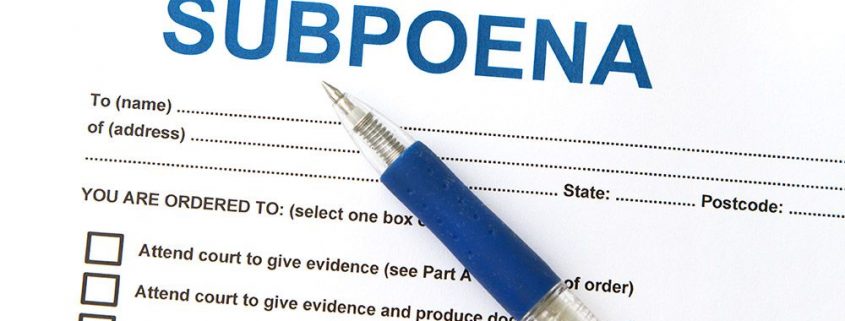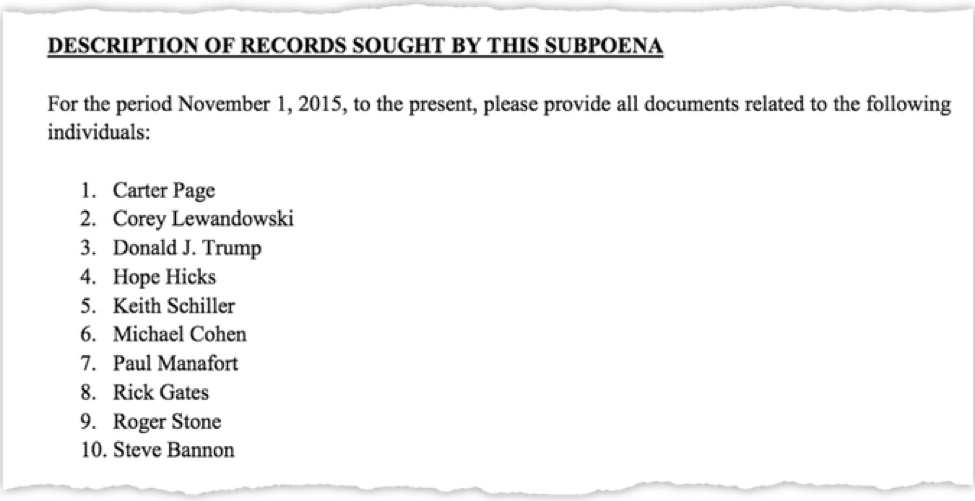The language in which much of the law is written and conducted in can be downright confusing…it’s not called legalese for nothing! Even basic words, like property and trust, can take on varied and more specific meanings than their normal everyday meanings. But other words and phrases are a part of most adult Iowan’s peripheral lexicons if even from watching shows like The Good Wife or the nightly news Certain events or people can also spark an interest in legal-based terminology. For instance, many more people have now heard of the legal term “inclusion rider” thanks to Frances Dormand’s Best Actress acceptance speech at the recent Academy Awards. We’ve seen plenty of headlines featuring the word “subpoena” in the news cycle recently particularly in relation to a former outspoken Trump aide. It’s one of those words you kind of know, or think you may know, but again aren’t for sure. In order to better understand what’s going on with special counsel Robert Mueller’s investigation on Russia’s interference in the 2016 elections, let’s review what the legal term “subpoena” really means and if you can simply ignore it or refuse to cooperate if you want to…looking at you, Sam Nunberg.
What Does Subpoena Mean?
A subpoena is a formal court-ordered command to do something specific. There are two main, different kinds of subpoenas. (Quick phonetics lesson: the “b” is silent and the “poe” makes a long “e” sound.”) We’ll use the former Trump campaign aide (and defendant in a Trump lawsuit) Sam Nunberg as an example throughout.
Subpoena duces tecum
One type, subpoena duces tecum, demands you present a kind of tangible evidence like a physical item or document. For instance, a subpoena could request letters, photographs, emails, audio recordings, video footage, and text messages related to the case. (In fact, as a practical matter, a subpoena duces tecum will generally request all these items).
In the case of Sam Nunberg, the subpoena requested documents and communications dating back to November 2015 with people related to the scope of the investigation such as Donald Trump, former campaign advisor Roger Stone, Trump’s lawyer Michael Cohen, and former chief strategist Steve Bannon, among others. The subpoena was issued by a grand jury. (Grand jury reminder: a prosecutor establishes a grand jury to determine if there is enough probable cause, or evidence, to pursue a criminal case.) Earlier this week, Nunberg said in an interview he “objected to the subpoena because it asks for information about people whom he either never talked to or with whom he had close relationships.” Nunberg also asserted that it wasn’t fair for the investigation to demand his personal communications and that his emails weren’t relevant to the investigation.
An excerpt from Nunberg’s subpoena | The New York Times
Subpoena ad testificandum
The other type of subpoena is ad testificandum, which compels a person to give their oral testimony at a specific time before an authorized legal body, such as a court, congressional/legislative body, grand jury, or government administrative agency. Before such a subpoena is issued, the person or group seeking information will typically first seek testimony on a voluntary basis. (For example, Trump’s White House attorneys have provided the investigation team with voluntary testimony.)
In the two-page subpoena, Nunberg was also requested to appear before a federal grand jury testimony and deliver oral testimony this Friday, March 9.
Subpoenas & Enforcement
Quite literally the word subpoena is derived from the similar Latin term sub poena which means “under penalty.” This makes it pretty obvious that there are penalties involved if you don’t do whatever is requested without a valid reason. If you receive a subpoena and you don’t cooperate with the (presumptively reasonable) request, you could be held in contempt of court and/or hit with time in jail and/or a fine.
Relating this back to our infamous subpoenaed headliner—when Nunberg was asked by MSNBC if he was worried about being arrested for defying the subpoena, he didn’t seemed concerned and said, “I think it would be really, really funny if they wanted to arrest me because I don’t want to spend 80 hours going over emails I had with Steve Bannon and Roger Stone.”
If no proper legal reason was asserted by Nunberg’s attorneys, and he failed to testify in front of the federal grand jury, prosecutors could ask a judge to grant a bench warrant for Nunberg’s arrest.

Can You Refuse a Subpoena at all?
Some scenarios allow you to present a valid legal defense against complying with the subpoena. You can claim the subpoena’s request(s) is overly taxing or too expansive in scope. You could also refuse if the material(s), info, or data requested is eternally lost, or is privileged in nature. (Think attorney-client, executive, or physician-patient privilege.) Another avoidance tactic for a subpoena in criminal cases is asserting it violates your Fifth Amendment right not to incriminate yourself. (This, however, would still require you to show up, you just wouldn’t have to answer questions). Of course, these efforts aren’t always successful, and the subpoena could still be enforced.
In short, Nunberg’s defense of “screw that” without anything to back it up, is not a proper excuse.
In the latest reporting on Nunberg, apparently he’s indicated he will now cooperate with Mueller and comply with the subpoena.
Subpoenas are serious legal documents and always require serious legal advice. It’s important to seek counsel from a trusted attorney if you get served with a subpoena, most especially if you want to deny a subpoena request.

Applicability of this Knowledge to Nonprofits
You may be thinking, “wow, this is all really interesting, and thanks so much, but what the heck does this have to do with nonprofits?”
It’s true that the mission of Gordon Fischer Law Firm is to promote and maximize charitable giving in Iowa.
Realize that nonprofits can receive subpoenas, too! And they do!
Remember, as was stated earlier, subpoenas can be issued not only by grand juries, but also by government agencies. So, if a disgruntled ex-employee complains, you might receive a subpoena from, say, OSHA, or the Department of Labor, or the Iowa Civil Rights Commission. It’s critically important that if this happens to you, or your fave nonprofit, you understand all the legal rights and responsibilities by contacting appropriate counsel.
Questions? Thoughts? Tell me in the comments section below or contact me via email or phone (515-371-6077).


